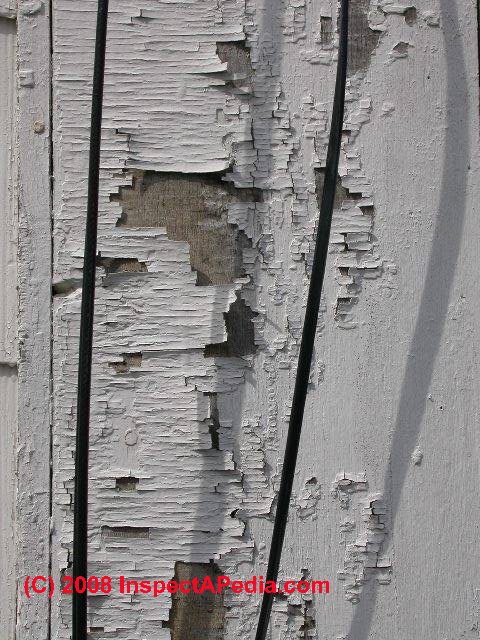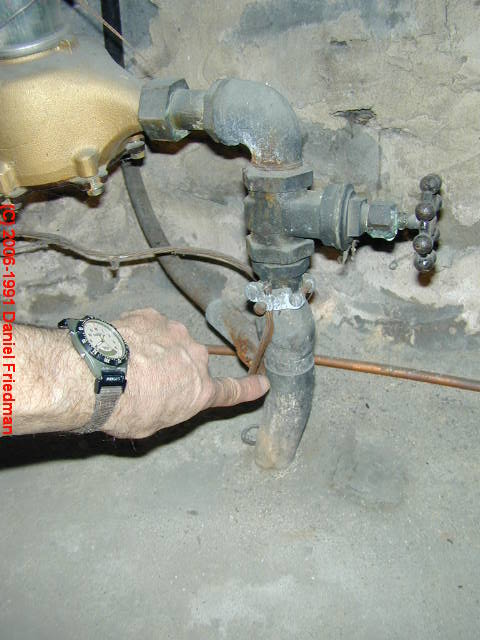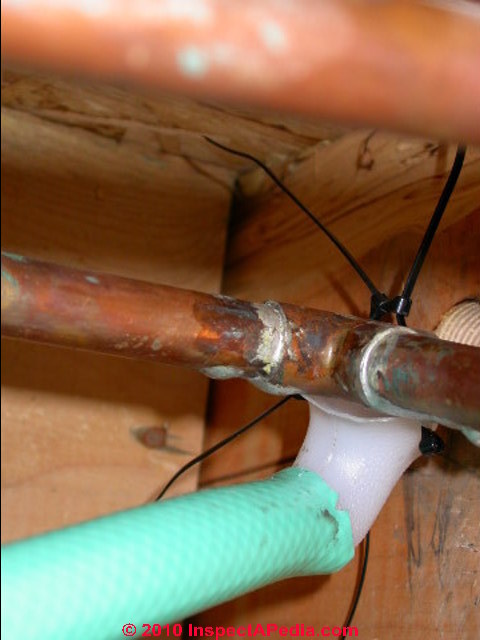 Lead Exposure Hazards On & In Buildings
Lead Exposure Hazards On & In Buildings
How to recognze lead hazards & what to do about it
- POST a QUESTION or COMMENT about lead exposure hazards in buildings
A Quick Guide to Lead Exposure Hazards Indoors:
This article explains simple steps to reduce the hazard of lead exposure in homes. Our page top photo shows lead paint in poor condition on painted wood trim in a home.
Paint in this condition is a particular hazard to children but it is also dangerous to home remodelers who may remove or strip lead paint if proper precautions are not taken.
InspectAPedia tolerates no conflicts of interest. We have no relationship with advertisers, products, or services discussed at this website.
- Daniel Friedman, Publisher/Editor/Author - See WHO ARE WE?
Quick & Simple Guide to Lead Exposure Hazards Indoors
This article includes excerpts or adaptations from Best Practices Guide to Residential Construction (Steve Bliss, J Wiley & Sons) , by Steven Bliss, courtesy of Wiley & Sons. As reported in Best Practices Guide to Residential Construction (Steve Bliss, J Wiley & Sons) :
Lead: the No. 1 Environmental Threat to Children:
In 1991, the Secretary of the Department of Health and
Human services called lead “the number-one environmental
threat to the health of children in the United States.” The
leading source of lead exposure today is old lead-based
paint in homes built before 1960, although homes built until
1978 may also contain lead paint.
Other sources include contaminated soil and drinking water that runs through old lead piping. Hobby activities, such as soldering and stained- glass making, can also introduce lead into the home.
Where two painted surfaces abrade,
such as door and
window frames, lead dust can be released and later ingested
by children. High-level exposures leading to acute
illness can be created when lead-based paint is removed
by sanding, scraping, or open-flame burning.
The soil
around old houses c
an also contain high levels of lead from
paint scrapings over the years, and the soil around highways
can have high levels from leaded gasoline. Playing
in contaminated soil can be a threat to children, and contaminated
soil can also be tracked into homes, contributing
significantly to indoor levels.
Health Effects of Lead Exposure
 Our photo (left) shows an antique food serving platter that contains high levels of lead.
Our photo (left) shows an antique food serving platter that contains high levels of lead.
at LEAD TEST KIT for HOME USE we discuss how an item like this can be tested for lead at low cost. Best Practices continues:
Lead affects most systems of the body. Even at low levels, harm to fetuses and young children can be significant.
Blood lead levels as low as 10 micrograms per deciliter can impair mental and physical development, leading to lower IQ levels, shortened attention spans, and increased behavioral problems.
Lead is more easily absorbed into the bodies of fetuses, infants, and children, and they are more sensitive to the damaging effects.
Also, children often have higher exposures, since they are more likely to get lead dust on their hands and then put their fingers or other lead-contaminated objects into their mouths.
Acute exposures to high levels of lead generated from remodeling activities can cause adverse health effects on the central nervous system, kidney, and blood cells. A
t very high levels (above 80 micrograms per deciliter of blood), lead can cause convulsions, coma, and even death.
Guide to Reducing Exposure to Lead Hazards Indoors and in Drinking Water
 Lead pipes in building water supply system
Lead pipes in building water supply system
Our photo (left) shows the characteristic "wipe joint" that can help identify lead water supply piping at a building. See LEAD PIPES in BUILDINGS for details about this significant source of lead levels found in some people.
See LEAD IN DRINKING WATER, HOW to REDUCE and for more details on lead in water.
Also see LEAD in WATER, ACTION LEVELS
Continuing from from Best Practices Guide to Residential Construction (Steve Bliss, J Wiley & Sons) :
Lead Paint On Buildings
Since lead paint is the leading cause of exposure, preventive measures focus on keeping paint in good condition and cleaning up any lead- containing dust before children are exposed.
In older homes with lead paint, experts recommend mopping floors and wiping window ledges and other smooth flat areas with damp cloths frequently, keeping children away from areas where paint is chipped, peeling, or chalking and preventing children from chewing on window sills and other painted areas.
Also, ensure that toys are cleaned frequently and hands are washed before meals. If the paint is in poor condition, it should be removed by a licensed lead- abatement professional. Recommendations include:
- Keep areas where children play as dust-free and clean as possible.
- Leave lead-based paint undisturbed if it is in good condition; do not sand, scrape, or burn off paint that may contain lead.
- If the paint needs to be removed, hire a licensed professional with training in lead abatement.
- Do not bring contaminated soil or lead dust into the home.
- If your work or hobby exposes you to lead, change clothes and use doormats before entering your home. Demolition and work along roads and highways are examples.
- Eat a balanced diet, rich in calcium and iron. A child who eats enough iron and calcium will absorb less lead.
-- Adapted with permission from Best Practices Guide to Residential Construction (Steve Bliss, J Wiley & Sons) .
- See LEAD POISONING HAZARDS GUIDE for details about toxic lead sources in buildings, on building materials and paints, and from other sources
- See LEAD CONTAMINATION HAZARDS in the HOME for an extensive list of in-home lead hazards
- See LEAD IN DRINKING WATER, HOW to REDUCE for advice about testing for lead in drinking water
- See LEAD TEST KIT for HOME USE for our field test of a home test kit for lead contamination on building surfaces

- Copper pipe joints soldered with high-lead solder: Lead in solder used to join copper water supply piping in older buildings can present a lead poisoning health hazard that varies by
the extent of lead solder used, how the joints were soldered (did the installer push blobs of solder into the pipe interior), and the chemistry of water flowing through the pipes. Lead hazards associated with water piping are discussed in detail at LEAD PIPES in BUILDINGS.
Our photo (left) shows how a homeowner coped with a leak at a soldered (sweated) copper water supply pipe elbow that was difficult to reach for repair.
Watch out: OPINION: because soldering copper pipe fittings when using newer low-lead-content solder requires higher heat than the old high-lead solder, newer soldered joints can be messier-looking.
But you should not rely on the physical appearance of a copper pipe connection to guess at its lead content, as the workmanship of individual plumbers varies widely, and a joint that was wiped clean during soldering looks neat and clean regardless of which solder type was used.
Test your copper plumbing for lead?
To know if your copper pipe connections were soldered using a high-lead-content solder you can use an inexpensive lead test widely available online and at building suppliers.
You can also test building water itself for lead content, but as we have shown
at LEAD PIPES in BUILDINGS, it's easy to conduct water test sample collection so as to skew results to show very high or very low lead content.
If the piping in your home is old it would be prudent to assume that there is lead used in its connectors even without testing many of them. Various sources have pointed out that
In 1986, Congress banned the use of lead solder containing greater than 0.2% lead, and restricted the lead content of faucets, pipes and other plumbing materials to 8.0%. Older construction may still have plumbing that has the potential to contribute lead to drinking water. [29]
...
Continue reading at LEAD POISONING HAZARDS GUIDE for our full list of environmental hazard identification and remedy related to lead in or on buildings, or select a topic from the closely-related articles below, or see the complete ARTICLE INDEX.
Or see these
Recommended Articles
- ENVIRONMENTAL HAZARDS at BUILDINGS - home
- FEAR-O-METER: Dan's 3 D's SET REPAIR PRIORITIES
- LEAD CONTAMINATION HAZARDS in the HOME - CPSC
- LEAD POISONING HAZARDS GUIDE - home
- LEAD POISONING SYMPTOMS
Suggested citation for this web page
LEAD EXPOSURE HAZARDS INDOORS at InspectApedia.com - online encyclopedia of building & environmental inspection, testing, diagnosis, repair, & problem prevention advice.
Or see this
INDEX to RELATED ARTICLES: ARTICLE INDEX to BUILDING ENVIRONMENT
Or use the SEARCH BOX found below to Ask a Question or Search InspectApedia
Ask a Question or Search InspectApedia
Try the search box just below, or if you prefer, post a question or comment in the Comments box below and we will respond promptly.
Search the InspectApedia website
Note: appearance of your Comment below may be delayed: if your comment contains an image, photograph, web link, or text that looks to the software as if it might be a web link, your posting will appear after it has been approved by a moderator. Apologies for the delay.
Only one image can be added per comment but you can post as many comments, and therefore images, as you like.
You will not receive a notification when a response to your question has been posted.
Please bookmark this page to make it easy for you to check back for our response.
Comments
IF above you see "Comment Form is loading comments..." then COMMENT BOX - countable.ca / bawkbox.com IS NOT WORKING.
In any case you are welcome to send an email directly to us at InspectApedia.com at editor@inspectApedia.com
We'll reply to you directly. Please help us help you by noting, in your email, the URL of the InspectApedia page where you wanted to comment.
Citations & References
In addition to any citations in the article above, a full list is available on request.
- Steve Bliss's Building Advisor at buildingadvisor.com helps homeowners & contractors plan & complete successful building & remodeling projects: buying land, site work, building design, cost estimating, materials & components, & project management through complete construction. Email: info@buildingadvisor.com
Steven Bliss served as editorial director and co-publisher of The Journal of Light Construction for 16 years and previously as building technology editor for Progressive Builder and Solar Age magazines. He worked in the building trades as a carpenter and design/build contractor for more than ten years and holds a masters degree from the Harvard Graduate School of Education. Excerpts from his recent book, Best Practices Guide to Residential Construction, Wiley (November 18, 2005) ISBN-10: 0471648361, ISBN-13: 978-0471648369, appear throughout this website, with permission and courtesy of Wiley & Sons. Best Practices Guide is available from the publisher, J. Wiley & Sons, and also at Amazon.com - [29] "Sources of Lead [in and around the home]", New York State Health Department, website retrieved 2/19/2013, original source: http://www.health.ny.gov/environmental/lead/sources.htm [copy on file as Lead_Sources_NYS_DOH.pdf]
- Our recommended books about building & mechanical systems design, inspection, problem diagnosis, and repair, and about indoor environment and IAQ testing, diagnosis, and cleanup are at the InspectAPedia Bookstore. Also see our Book Reviews - InspectAPedia.
- Best Practices Guide to Residential Construction, by Steven Bliss. John Wiley & Sons, 2006. ISBN-10: 0471648361, ISBN-13: 978-0471648369, Hardcover: 320 pages, available from Amazon.com and also Wiley.com. See our book review of this publication
- In addition to citations & references found in this article, see the research citations given at the end of the related articles found at our suggested
CONTINUE READING or RECOMMENDED ARTICLES.
- Carson, Dunlop & Associates Ltd., 120 Carlton Street Suite 407, Toronto ON M5A 4K2. Tel: (416) 964-9415 1-800-268-7070 Email: info@carsondunlop.com. Alan Carson is a past president of ASHI, the American Society of Home Inspectors.
Thanks to Alan Carson and Bob Dunlop, for permission for InspectAPedia to use text excerpts from The HOME REFERENCE BOOK - the Encyclopedia of Homes and to use illustrations from The ILLUSTRATED HOME .
Carson Dunlop Associates provides extensive home inspection education and report writing material. In gratitude we provide links to tsome Carson Dunlop Associates products and services.


No one has commented yet. Be the first!